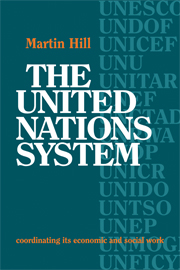Book contents
- Frontmatter
- Contents
- Foreword
- Preface
- Introduction
- Part I The problem of coordination and its setting
- Part II Some conclusions and suggestions
- Postscript
- 1 Abbreviations and glossary of institutions
- 2 Principal organs of the United Nations (General Assembly, Economic and Social Council and Secretariat) with main subsidiary organs directly concerned with economic and social cooperation and coordination (Status as of Spring 1976)
- 3 Chart of agencies related to the United Nations
- 4 Regional and branch offices of organizations of the United Nations System
- 5 Chart of the United Nations System
- 6 A new UN structure for global economic cooperation–list of conclusions and recommendations of the Group of Experts, prepared by the Secretariat
- Notes
- Index
6 - A new UN structure for global economic cooperation–list of conclusions and recommendations of the Group of Experts, prepared by the Secretariat
Published online by Cambridge University Press: 05 November 2011
- Frontmatter
- Contents
- Foreword
- Preface
- Introduction
- Part I The problem of coordination and its setting
- Part II Some conclusions and suggestions
- Postscript
- 1 Abbreviations and glossary of institutions
- 2 Principal organs of the United Nations (General Assembly, Economic and Social Council and Secretariat) with main subsidiary organs directly concerned with economic and social cooperation and coordination (Status as of Spring 1976)
- 3 Chart of agencies related to the United Nations
- 4 Regional and branch offices of organizations of the United Nations System
- 5 Chart of the United Nations System
- 6 A new UN structure for global economic cooperation–list of conclusions and recommendations of the Group of Experts, prepared by the Secretariat
- Notes
- Index
Summary
WHY RESTRUCTURING?
1. In its thirtieth anniversary year the United Nations has reached a turning point. In one direction lies the prospect of new capacity to cope with the central issues facing mankind in the decisive last quarter of the twentieth century. In the other direction lies the danger of a decline in the effectiveness of the United Nations. Which direction the Organization takes will be significantly influenced by the decisions on policy and structural questions which its Member States take in the months and years ahead. A world without a strong United Nations, in the opinion of the Group, is inconceivable. It is in the interest of every Member of the United Nations to make the Organization a more effective instrument for the strengthening of international peace and security and for international economic and social cooperation, (paras, 1 and 2.)
2. The proposals of the Group of Experts for structural change are designed to enable the United Nations System to:
(a) Deal with international economic and social problems in a more effective and comprehensive manner, with better coordination throughout the United Nations System as a whole;
(b) Harmonize, as far as possible, the views and approaches of Member countries towards these problems;
(c) Contribute to a significant improvement in the transfer of real resources and technology to developing countries;
(d) Promote economic cooperation between States, including those with different social systems;
(e) […]
- Type
- Chapter
- Information
- The United Nations SystemCoordinating its Economic and Social Work, pp. 211 - 234Publisher: Cambridge University PressPrint publication year: 1978



